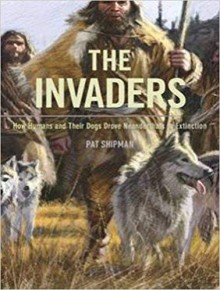
TITLE: The Invaders: How Humans and Their Dogs Drove Neanderthals to Extinction
AUTHOR: Pat Shipman
NARRATOR: Donna Postel
DATE PUBLISHED: 2015
FORMAT: Audiobook
ISBN-13: 9781494563097
____________________________
DESCRIPTION:
"Approximately 200,000 years ago, as modern humans began to radiate out from their evolutionary birthplace in Africa, Neanderthals were already thriving in Europe-descendants of a much earlier migration of the African genus Homo. But when modern humans eventually made their way to Europe 45,000 years ago, Neanderthals suddenly vanished. Ever since the first Neanderthal bones were identified in 1856, scientists have been vexed by the question, why did modern humans survive while their evolutionary cousins went extinct? The Invaders musters compelling evidence to show that the major factor in the Neanderthals' demise was direct competition with newly arriving humans. Drawing on insights from the field of invasion biology, Pat Shipman traces the devastating impact of a growing human population: reduction of Neanderthals' geographic range, isolation into small groups, and loss of genetic diversity. But modern humans were not the only invaders who competed with Neanderthals for big game. Shipman reveals fascinating confirmation of humans' partnership with the first domesticated wolf-dogs soon after Neanderthals first began to disappear. This alliance between two predator species, she hypothesizes, made possible an unprecedented degree of success in hunting large Ice Age mammals-a distinct and ultimately decisive advantage for humans over Neanderthals at a time when climate change made both groups vulnerable."
____________________________
DISCLAIMER:
I do not have a good relationship with audiobook - I tend to wool gather or fall asleep while listening to them. So I might have missed something and couldn't flip back to check.
____________________________
REVIEW:
This book is something of a detective/mystery novel where the author tries to find out why the Neanderthals went extinct. Her hypothesis makes use of ecological theory to suggest that modern humans have the same effect on the environment as any other invasive species competing with native animals for the same/similar resources - thus Neanderthals and other megafauna could have survived the cold climate at the time but could not survive the climate and the additional competition with modern humans and their pet wolves/dogs. The changing climate, changing food sources, other animals in the area, generic invasive species and their effects, hunting techniques, the arrival of modern humans, competition for the same/similar resources, as well as the domestication of wolves/dogs is discussed. The title of the book doesn't really fit with Shipman's hypothesis though, as according to the text, Neanderthals were already on their way out before homo sapiens (aka modern humans) migrated into Eurasia and the semi-domesticated wolf-dogs only arrived (according to available fossil evidence) after the Neanderthals were gone. The dogs only make an appearance about 3/4 through the book, if anyone is looking specifically for that information.
I'm not entirely convinced by her argument. The timing is a bit erratic, with Neanderthal populations declining before modern humans arrived and a large time gap between Neanderthals and domesticated wolves. She also doesn't take into account that dogs were domesticated from an extinct species of wolf that might not have behaved in the same way as the Grey wolves used in her study (she generally ignored all the other canid species and their interactions with humans). The author admits that there isn't enough evidence currently to say whether her hypothesis is correct or not, and that new advances in dating and additional fossil sites are required to either prove/disprove her hypothesis. Shipman's hypothesis of why modern humans domesticated wolves/dogs and Neanderthals didn't, is fairly interesting and new information seems to provide some confirming evidence. There is also some issue with her stating that Neanderthals ate only meat and didn't change their diet (especially in comparison with brown bear diet changes), when other studies state that some Neanderthals ate meat, others a mix, and some others ate mostly vegetables and thus changed their diet. There is also no mention of Denisovians (probably due to lack of evidence at time of publication). The DNA data on Neanderthal-Modern Human hybridization/interbreeding is also out of date. This makes me wonder what else is out of date and how that effects the hypothesis.
Pat Shipman helpfully makes a point of differentiating between speculation and inferences from hard, empirical evidence. There is a lot of space dedicated to dating of specific finds and analysis of particular fossil evidence. She does however, tend to repeat herself too often and harp on the same theme far too much (I got that humans are an invasive species after the first paragraph, I didn't need a whole chapter on the subject and several reminders throughout the book).
An interesting, but flawed, book.
NOTE ON AUDIOBOOK: Postel has a pleasant voice, narrates well and at a decent speed.
Humanity's Best Friend: How Dogs May Have Helped Humans Beat the Neanderthals
The Evolution of Puppy Dog Eyes
Some Neanderthals Were Vegetarian — And They Likely Kissed Our Human Ancestors



 Log in with Facebook
Log in with Facebook 










